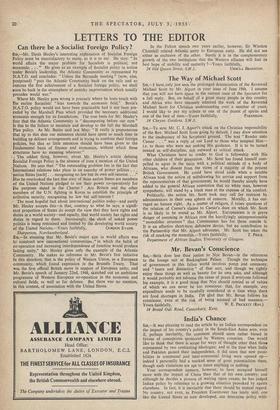LETTERS TO THE EDITOR
Can there be a Socialist Foreign Policy?
sit,—Mr. Denis Healey's interesting explanation of Socialist Foreign Policy must be unsatisfactory to many, as it is to me. He says: "In world affairs the major problem for Socialists is political, not economic. . . ." He gives as an example of Socialist policy in action under Bevin's leadership, the Atlantic Community as represented by N.A.T.O. and concludes: " Unless the Bermuda meeting " (now, alas, postponed) " puts the Atlantic Community back on the rails and so restores the first achievement of a Socialist foreign policy, we shall soon be back in the atmosphere of panicky improvisation which usually precedes world war."
Where Mr. Healey goes wrong is precisely where he loses touch with the earlier Socialists' " bias towards the economic field." Bevin's N.A.T.O. policy would not have been practicable had it not been pre- ceded by the Marshall Plan which provided the necessary additional economic strength for its foundations. The true basis for Mr. Healey's fear that the Atlantic Community is " decomposing before our eyes " is due to the failure to maintain and develop to the full the Marshall Plan policy. As Mr. Butler said last May: " It really is preposterous that up to this date our statesmen should have spent so much time in building up defence arrangements and in trying to combine their foreign policies, but that so little attention should have been given to the fundamental basis of finance and economics, without which these structures have no meaning whatever."
o The oddest thing, however, about Mr. Healey's article defining Socialist Foreign Policy is the absence of even a mention of the United Potions. He says that: " The outstanding problem lies in the fact that International relations take place in an anarchy of power politics .
r[tion States [each] ... recognising no law but its own self-interest...." as he overlooked the fact that sixty of these nation States are members of the United Nations pledged to use their power co-operatively for khe purposes stated in the Charter ? Are Britain and the other members of the U.N. fighting in Korea to establish the principle of collective security, recognising no law but self-interest ?
I The most hopeful fact about international politics today—and surely Mr. Healey accepts this—is that, contrary to what he says, a signifi- cant proportion of States do accept the view that they have rights and duties in a world society—and equally, that world society has rights and duties in regard to them. Increasingly, the clash of naked power politics is being restrained and limited by the developing world society of the United Nations.—Yours faithfully, GORDON EVANS. Sharperton, Northumberland.
SIR,—In stressing that Mr. Bevin's major aim in world affairs was to construct new international communities." in which the habit of co-operation and increasing interdependence of function would produce lasting unity," Mr. Healey gives only the example of the Atlantic Community. He makes no reference to Mr. Bevin's first initiative in this direction; that is the policy of Western Union, as a European community, which. found expression in the Brussels Treaty. That was the first official British move in support of European unity; and Mr. Bevin's speech of January 22nd, 1948, sketched out an ambitious programme of Western European co-operation in the economic and cultural fields, as well as for defence. But there was no mention, in this context, of association with the United States.
In the Fulton speech two years earlier, however, Sir Winston Churchill related Atlantic unity to European unity. He did not see either as exclusive of the other. Surely it is in the complementary growth of the two institutions that the Western alliance will find its best hope of stability and maturity ?—Yours faithfully,


























































 Previous page
Previous page